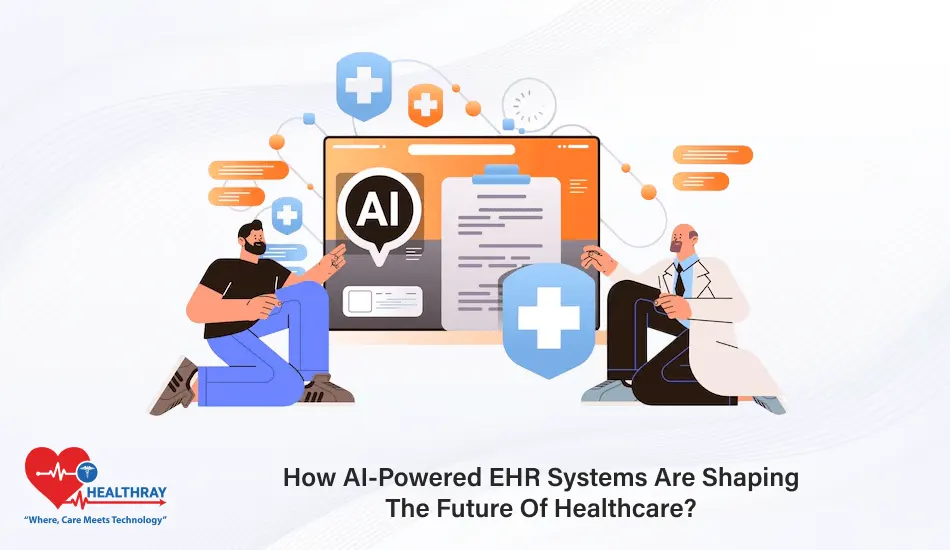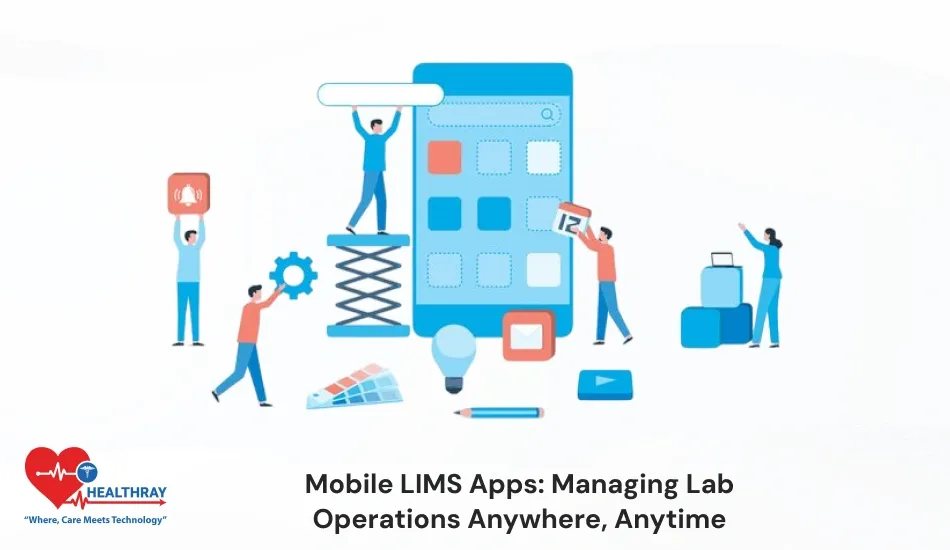AI may be highly regarded as a revolution in the world of healthcare, and EHR systems show importance in the AI-enabled world. They neither partially digitize the record nor replace clinicians in interacting with patient data but will influence how they perform their duties-from personalized treatment suggestions to workflow improvements for transforming patient care.
This article explores how AI-EHR Software is molding the horizon of future healthcare. There are advantages; impact on various stakeholders, what hinders successful implementation, and exciting turns of future possibilities. Then, time to discover how healthcare is converted into the future.
Benefits of AI EHR Systems
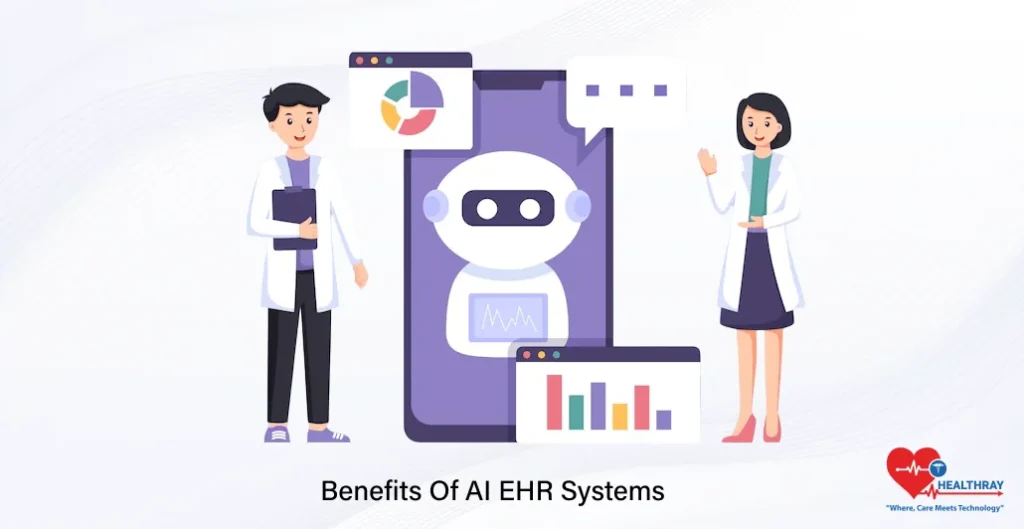
AI-powered EHRs are currently revolutionizing how health care is practiced and what they can do for patients as well as little administrative tasks. Here is the breakdown of the advantages:
Improvement of Patient Care
AI brings together all patient information from various sources-data on the patient’s medical history, lab results, and real-time health monitoring devices. This allows the health care provider to form a very personalized treatment plan. Predictive analytics can refer to health risks earlier, for action on preventive measures to be taken, resulting in better outcomes for patients.
Improvement of Clinical Decision Making
AI has the capacity to process a lot of data within a very short time. It would therefore offer recommendations that are evidence-based for clinicians. For instance, decision-support tools will assist physicians in making their choices of the best test or treatment on the grounds of patterns in data and historical outcomes. This reduces the chance for mistakes and supports better decision-making during critical moments.
Streamlining Administrative Duties
Documentations and administrative tasks often take most of a healthcare provider’s time. AI-powered systems can automate such tasks as scheduling appointments, billing, and summarizing even clinical notes. Many practices also use AI scribe software to assist psychiatrists and counselors in generating accurate clinical documentation quickly. This gives time to healthcare professionals to be more inclined to patient care in place of annoying fatigue and job dissatisfaction.
Cost and Time Efficiency
Workflow improvement brought about by AI has been related to automated repetitive tasks and the enhancement of efficiency in resource allocation. AI-powered EHRs, for instance, can identify operational inefficiencies in hospitals and cause reduced wait times and speedy admissions of patients. Such procurement enhances operational cost savings for healthcare institutions and a better general experience for patients.
Influence on Healthcare Stakeholders
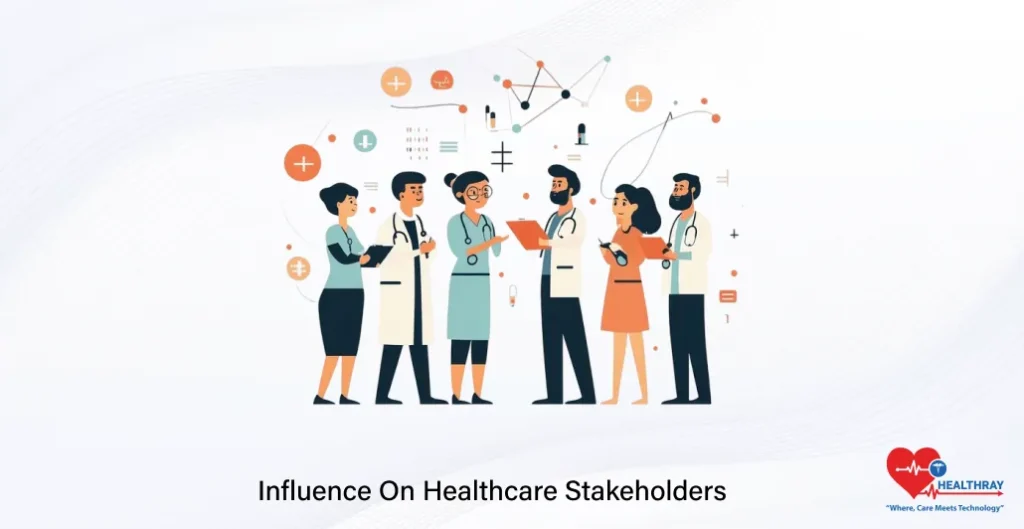
AI-enabled Electronic Health Records influence a wide range of stakeholders in the health ecosystem. This clearly differentiates the contributions of each benefit and challenge, thus making this innovation significant across the board.
Healthcare Professionals
AI-powered systems simplify complex workflows. Besides performing documentation, scheduling, or ordering tests, which would otherwise devour precious time, these systems have automated tasks to free the physicians and nurses to spend more time on patient care. AI-powered tools also provide real-time insights to the clinician’s guidance in diagnostics and treatment planning. However, the adaptation to these technologies may also require extra training and workflow adjustments, which proves to be a temporary stumbling block.
EHR Software Developers
The developers now view the inclusion of AI as one of the challenges and at the same time as an opportunity for new learning avenues through which they can use machine learning models and natural language processing into their platforms. Modifying these systems to be intuitive, secure, and compliant to be used in the healthcare context will take most of the time and effort. The developers should also form systems capable of hybrid using the current structures used in a hospital.
Hospital Administrators
An administrator who utilizes AI-powered EHR systems receives measures for operational data evaluations. A better resource plan-settings of reduced costs, improved patient satisfaction, and predicted analytics to help cope with excess patient load during peak periods-will also come about. Although the long-term benefits are quite amazing, initial costs of implementing AI-driven EHRs and overcoming organizational resistance may be difficult.
Patients
AI-powered systems will benefit patients through higher standards in care and shortening the time taken to provide service. It enhances the accuracy with which data is collected and stored and therefore decreases the chance of error in treatment plans or medication prescriptions. Also, AI would further patient engagement by providing an easy mechanism with which they access their health records and reminders for follow-ups. From the clinical perspective, issues around data privacy and security still remain one significant area of focus requiring careful balancing in building patient trust.
Implementation Difficulties In AI EHR System
Although Artificial Intelligence uses powers in Electronic Health Record, it has some challenges in achieving successful implementation. Such circumstances must be resolved to ensure smooth transitions into health systems.
Data Privacy and Security
AI Systems entail managing a huge quantity of sensitive patient data. Ensuring data security is a high priority for AI systems. Breaches or unauthorized access to such data can break public trust in health service and resolution may involve severe legal consequences. Although encryption, access control, and regulation requirements like those by HIPAA are necessary, they are an expensive resource use option to put in place.
Integrating with Existing Systems
Most of the healthcare systems are still actively using old legacy systems that do not fit well with AI powered platforms .It requires a lot of technical upgrades and involves huge costs as well as takes time during its transition towards a new system without causing disruption in the running operations.
Regulatory and Ethical Challenges
Stringent regulations surround AI in healthcare to protect patient safety and data integrity. Those hurdles are a formidable obstacle to implementing AI, with ethical concerns such as algorithm bias. The bias can manifest as an undesired outcome as AI systems trained with data that are skewed may give rise to inequalities in the care rendered.
High Implementation Costs
Upfront investments in AI-based EHR systems are a barrier to entry for many smaller providers. The costs refer to software acquisition and infrastructure upgrading as well as training. Even if the long-term payoff of such investments far outweighs them, obtaining the money might be the main challenge.
Workforce Training and Adaptation
Training will be a requisite for the health professionals and administrative workers to master using the AI engineering systems. Resistance can slow down the stage to adapt, particularly since change is often met with some degree of dissatisfaction and there is a high learning curve. Clear communications, particularly about the advantages that it will have, are required to overcome this challenge.
Emerging Trends In AI and EHR Packaging
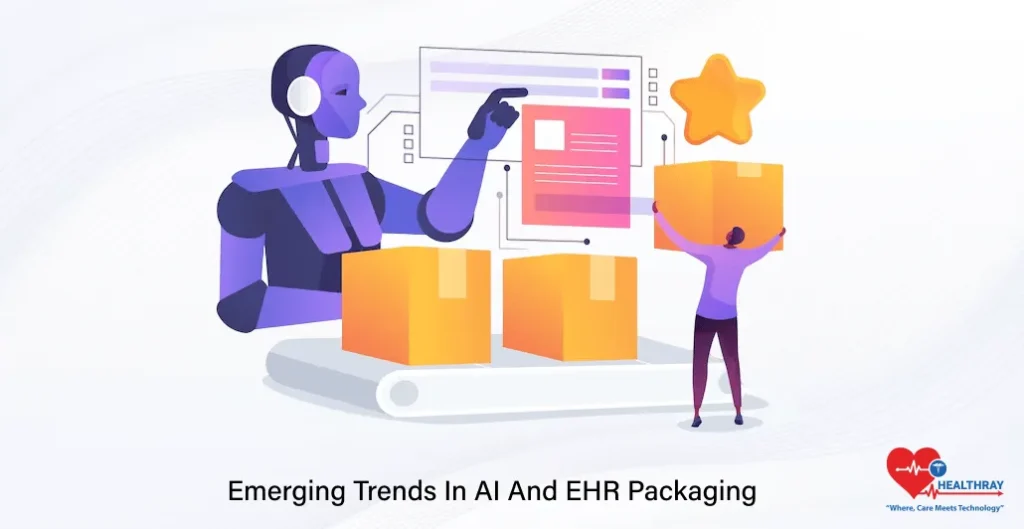
The evolution of the application of artificial intelligence in EHR would be phenomenal and bring radical changes to the health sector. Here is a glimpse of the trends in technology that are shaping the future of this technology:
Advanced Predictive Analytics
These systems will continue getting smarter in engaging predictive analytics so that it can presume future health threats. With the support of historical and real-time data analysis, The system shall be ready to determine the onset of chronic diseases and any possible complications. The ability of health care providers to act at an earlier stage would benefit both patients and purposes of lowering costs.
Enhanced Natural Language Processing
It should also enable better and seamless communication between the human component and the learning machine in the healthcare industry with NLP technology becoming even more sophisticated. It would mean that AI would have a much better understanding of the clinical documentation notes, spoken commands and unstructured data so that documentation could be carried out so much more quickly and accurately.
Personalized Medicine
The area that will improve with AI integration is personalized medicine because the treatments will now be more individualized according to the patients. Treatment recommendations, which include genetic data, lifestyle characteristics, and medical history, inform EHR systems on matching therapies aligned with a patient-specific profile, where counseling in personal medicine will be a breakthrough to revolutionize the way treatment is performed and enhance the effectiveness of care.
Real Time Decision Support
The EHRs of the future would soon perform real-time clinical decision support. For instance, during consultation with the patient, the system suggests treatment options based on a few similar cases and clinical guidelines, as well as the current health status of the patient. This improves the accuracy of outcomes produced and speeds up the care delivery process by eliminating some delays.
Blockchain for Data Security
In line with the growing concerns over data privacy, blockchain technology is expected to play a significant role in the securing of EHR data. Such records are decentralized and tamper-proof, which increases trust in AI-powered systems in an effort to safeguard sensitive information.
Integration with IoT and Wearables
In the future, EHR systems will bring together even more data from the Internet of Things and wearable health monitors. This means real-time patient data, St George massage such as heart rates, glucose levels, and activity metrics, will be transmitted to their healthcare provider for in-hospital management of chronic diseases and preventive measures.
AI-Driven Population Health Management
AI would broaden its role in the management of population health by analyzing trends in data across communities. It helps in outbreak identification, disease pattern tracking, and informing public health policies-things that would be allowed by networking population health trends with healthcare organizations, resulting in more effective resource management and improved community health outcomes.
Conclusion
AI-powered EHR systems are changing the way healthcare is practiced today. They were yesterday unimaginable. EHR systems not only enhance patient care but also improve workflow processes, reduce administrative burdens, and anticipate future technology for personalized medicine. Predictive analytics, natural language processing, and IoT data come together to arm the healthcare provider with tools to optimize better outcomes.
It is, however, not clear-cut all the way through to their general acceptance, as ambivalence defeats many advances. From data privacy to implementation costs, we need to crush any barriers to reaching the full potential of this technology. Thus, with improvements in AI and Hospital Management System integration, the healthcare industry seems to be much at the verge of change.
Healthcare is undoubtedly moving into a digital era, and AI-powered EHR systems are driving this change. Whether you are a medical professional, a hospital administrator, an IT developer, or a concerned patient, the journey promises to smarten up healthcare and increase its speed in providing patient-centric solutions.
